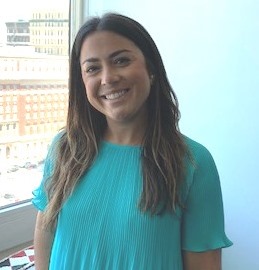Aria Auerbach, Project Manager, brings a strong focus on planning, organization, and systems-building to her resource development and strategy work at Fairmount. Her client projects benefit from her range of past experience in development, volunteer engagement, and events strategy, including expertise in prospect identification and management. Aria earned her B.A. in Psychology from Wheaton College and her M.B.A. from Drexel University.
FV: You recently received your MBA in Entrepreneurship and Innovation Management. What can nonprofits learn from current practices in business innovation?
Business Innovation is all about being smart, strategic and creative, in ways that enhances already defined procedures and processes. Why reinvent the wheel if it’s already spinning? In order for nonprofits to be successful and sustainable, they have to operate as businesses with the flexibility to adapt and adjust throughout their lifecycle. Some of the current best practices around business innovation involve collaboration and conversations. It’s so important for nonprofits to embrace their strengths across staff, structure and strategy. And in order to stay innovative, organizations need to create knowledge repositories, where this type of information can be shared—opportunities for people to learn together, share best practices and experiences and help shape the individual and collective organizational culture.
FV: How do you apply your expertise in planning, organization, and systems to your work on Fairmount’s clients’ behalf?
A lot of lists and color-coded spreadsheets! Being organized and date-conscious is the most important aspect of my client-facing work. I always review a project timeline from start to finish before diving into the tasks at hand. I pay close attention to any technologies or materials that might be needed throughout, and typically build a calendar of “soft deadlines” for myself. As a consultant, I have to be proactive and plan on my clients’ behalf. I think about the big picture deliverables from a client-perspective, and the smaller task-oriented to dos. There is no one size fits all approach to client success; the recipe involves a combination of customized best practices and resources, mixed with friendly reminders and guidance of how and when to get things done.
FV: What does a typical day look like for you?
I think this one of aspects of Fairmount I love most—that no two days are ever the same! Anticipating my client’s needs comes first and typically informs my daily agenda. Then, no matter what is on my calendar, my day involves a combination of strategic thinking, thoughtful preparation, and proactive problem solving. On any given day, I can spend several hours doing research—researching peer organizations, the Philadelphia funder landscape, donor interests, new organizations whose missions may overlap to a client’s mission—or writing. I really love writing, so those days are some of my favorites. Writing ranges anywhere from compiling research findings into a strategic recommendation plan document, to fundraising collateral decks or brochures, even to speaking points and presentation materials, for our clients. Other days, I am meeting with stakeholders and speaking with funders.
FV: You worked at several nonprofits in NYC prior to moving to Philly. How do these previous experiences inform your approach to resource development?
Throughout my previous roles in NYC, I learned that strategic fundraising and resource development requires a deep knowledge and awareness of the funder landscape. A meaningful conversation always begins with listening—listening to what interests a prospective funder, listening to organizational needs, listening to how external factors may impact funder behaviors—and then continues with developing strategies and processes that align with what has been heard. In my role at Fairmount, I continue to build my understanding of what makes Philadelphia’s fundraising landscape unique so that I am able to help develop customized resource development plans and strategies for our clients.
FV: What are some of your favorite things to do in Philadelphia?
Aside from trying new restaurants and perpetually searching for the East Coast’s best burrito, I love walking around the streets of Philadelphia and learning all the tidbits of history that are embedded on the sidewalks! There are over 300 historical markers in Philadelphia alone and my goal is to find them all. Philadelphia is a city of firsts: home to the first American-brewed beer, the first children’s hospital, the first horticultural event in the nation, and the first sale and production of Girl Scout Cookies. I also try to do something “cultural” every Sunday—going to a new museum, walking around a new neighborhood, attending one of the many food festivals, exploring a local art gallery…an activity that keeps me engaged and involved in all the city has to offer.
